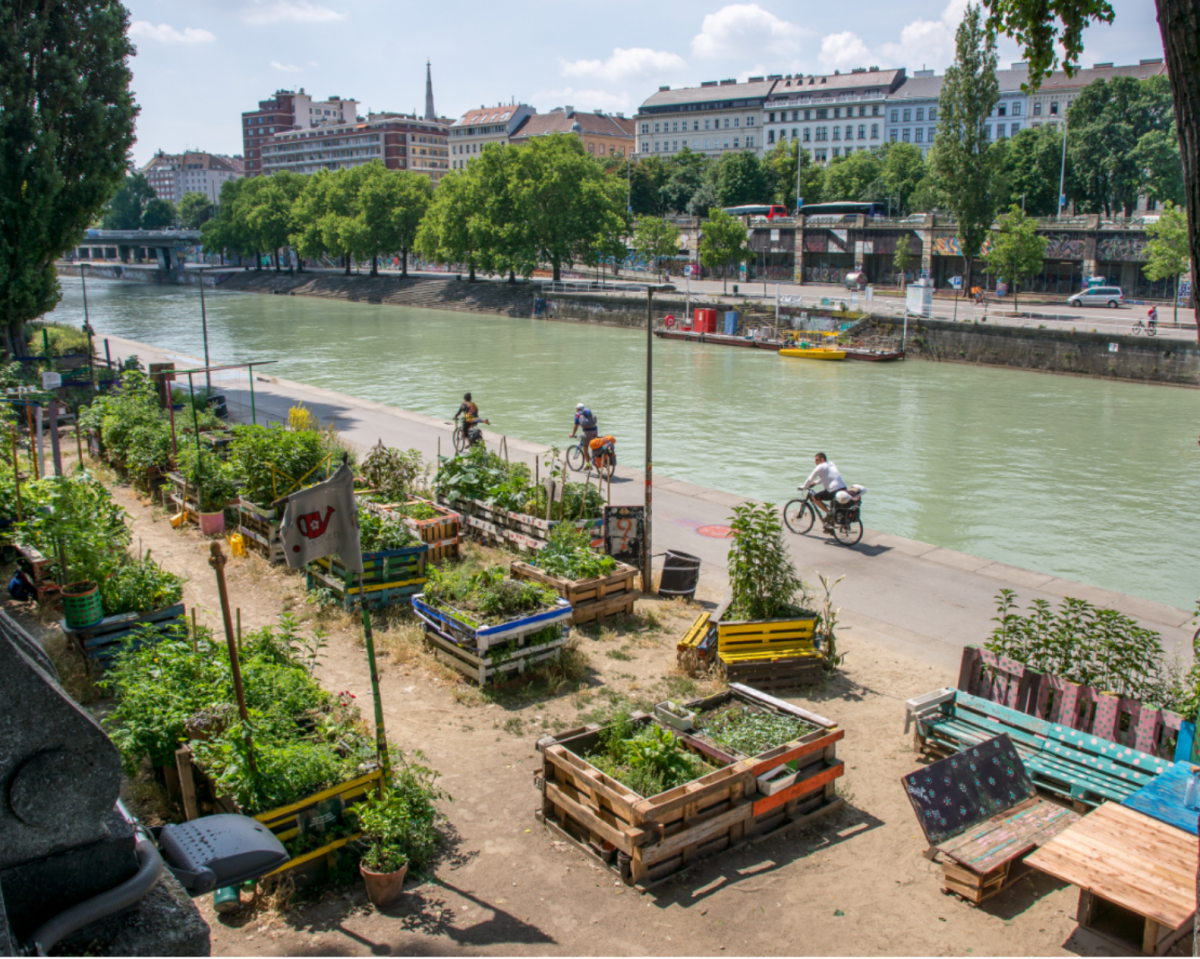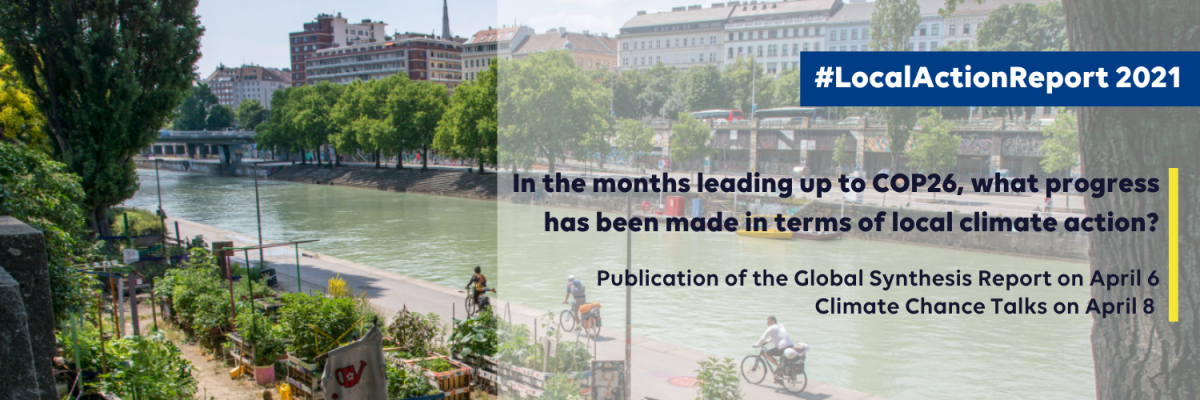
Publication of the Global Synthesis Report on local climate action 2021
In the months leading up to COP26, what progress has been made in terms of local climate action?
RELEASE OF THE 2021 GLOBAL SYNTHESIS REPORT ON LOCAL CLIMATE ACTION CLIMATE CHANCE OBSERVATORY
While the ambition of the States is stalling, local governments are demonstrating tangible results in their climate action despite the pandemic.
Ronan Dantec, Président of the Climate Chance Association

The integration of cities and regions into climate strategies is a fundamental issue at a time when States are renewing their commitments to the United Nations Framework Convention on Climate Change, five years after the Paris Agreement. According to the UNFCCC, the combined efforts of the States in their renewed contributions to the Paris Agreement are far from sufficient to limit warming to 1.5°C or even 2°C. However, all over the world, cities and regions are innovating, applying ambitious actions and obtaining concrete results to move towards a low-carbon society.
The 2021 Global Synthesis Report on Local Climate Action is therefore a stocktake, a synthesis and a deciphering of these actions implemented and the results obtained at the local level and thanks to the international cooperation of local authorities.
The significance of the Local Action Report lies in its specific approach. It ‘narrates’ the story behind the greenhouse gas emission figures and provides a synthesis of the most recent data on the action of local authorities in the world, based on a deciphering of different sources: the latest evaluation reports on the action of cities and regions, academic studies, expertise of the networks of local authorities partners of Climate Chance.
It is enriched by analyses of several case studies presenting innovative experiments of local authorities mobilised and particularly committed to the climate front, despite the context of Covid-19: Bahia, Bogota, Dakar, Scotland, Manchester, Melbourne, Mexico, Occitania, Ontario, Palembang, North Rhine-Westphalia, San Carlos de Bariloche, Slavutych, Strasbourg, Turin…
This new Report follows and deciphers progress in terms of local climate action and takes stock of local governments’ climate action around the world, a few months before COP26.
WHAT ARE THE KEY TAKEAWAYS OF THE 2021 LOCAL ACTION REPORT?
1. The reduction of GHG emissions from European cities is encouraging: 1,800 cities representing about 15% of the EU’s GHG emissions and 20% of its population have reduced their emissions by 26% between 2005 and 2017, exceeding the EU’s 2020 targets. However, in a context of massive adoption of carbon neutrality targets worldwide, monitoring the impact of local climate policies remains difficult as it is not yet based on consolidated methods, even at national level.
2. The mobilisation of local governments and the structuring of their climate action is continuing. The international initiatives of cities and regions (Global Covenant of Mayors, Under2 Coalition, RegionsAdapt, etc.) are particularly dynamic in Latin America, Europe and North Africa. On the other hand, there is still insufficient information to report on the action of local and sub-national governments in Asia.
3. Even in times of Covid-19, innovation and experimentation with climate policies continues to take place at local level. « Tactical urbanism » and cycling policies were the most obvious manifestations of this. At the city level, the densification and distribution of services for more autonomous regions is now seen as the remedy for the health and climate crises.
4. Among the national contributions to the Paris Agreement renewed by the countries in 2020, few mention governance mechanisms that integrate local governments, except in Latin America. Their sectoral approach to tackling emissions reduction in the cities and regions hides the potential linked to spatial planning and local leadership.
5. In the climate governance systems examined in the G20 countries (Germany, Canada, France, Brazil), few cities are subject to regulatory obligations, and French local authorities are the exception, in particular because of their obligations to draw up inter-municipal “territorial climate-air-energy plans” (PCAETs in French) and to include a climate component in regional plans for planning, sustainable development and regional equality (SRADDET in French). Their action therefore relies on the disparate support of states and sub-national governments. The limited harmonisation of monitoring methods partly explains the poor integration of the potential of cities and local authorities into national strategies.
6. After a few years of adoption, the local and regional authorities are seizing the Sustainable Development Goals (SDGs) around the issue of « 2030 Agendas ». In Europe, out of the 34 networks of local authorities from 28 European countries surveyed, 82% are aware of the SDGs and regularly refer to them in their activities, compared to only 31% the previous year.
7. We are seeing a much stronger consideration of adaptation by local governments. Among the cities in the European Covenant of Mayors surveyed in 2020, 70% report adaptation projects, but most of these are still uninitiated. A similar proportion of RegionsAdapt regions report having an adaptation plan in place. Risk assessment and planning seem to be spreading, but access to financing and technical responses, technologies that are still too little advanced or too expensive, are the next decisive challenges to be met.
A special day of discussion and insight-sharing with high-level panelists on the major trends of the Report will be held on 8 April. Come and learn more by participating in the 2 round tables organised during the Climate Chance Talks
PLACING THE REPORT IN PERSPECTIVE
The 2021 Local Action Report is part of the flagship publications of the Observatory of Non-State Climate Action. Created in 2018, the Observatory publishes 3 annual reports on climate action analysed from many perspectives: finance, main GHG-emitting sectors, and local actors, on a global scale, as well as numerous case studies on countries, cities and regions. Climate Chance continues its mission of observing the implementation of announced actions, monitoring the evolution of mobilisations, and analysing the strategies of actors in relation to international climate objectives.
ABOUT CLIMATE CHANCE
Created in 2015, Climate Chance is the only international association, participating in the mobilisation in the fight against climate change, by seeking to federate all non-state actors recognised by the United Nations Framework Convention on Climate Change – UNFCCC.
Its objective? To strengthen climate action led by local authorities, businesses and civil society by networking actors and sharing practices, to defend and disseminate priorities and common proposals, and to contribute to achieving the objectives of the Paris Agreement.
PRESS CONTACT
Virginie Foucault-Rougé – Head of communications
virginie.foucault-rouge@climate-chance.org ǀ +33 6 11 96 25 10


